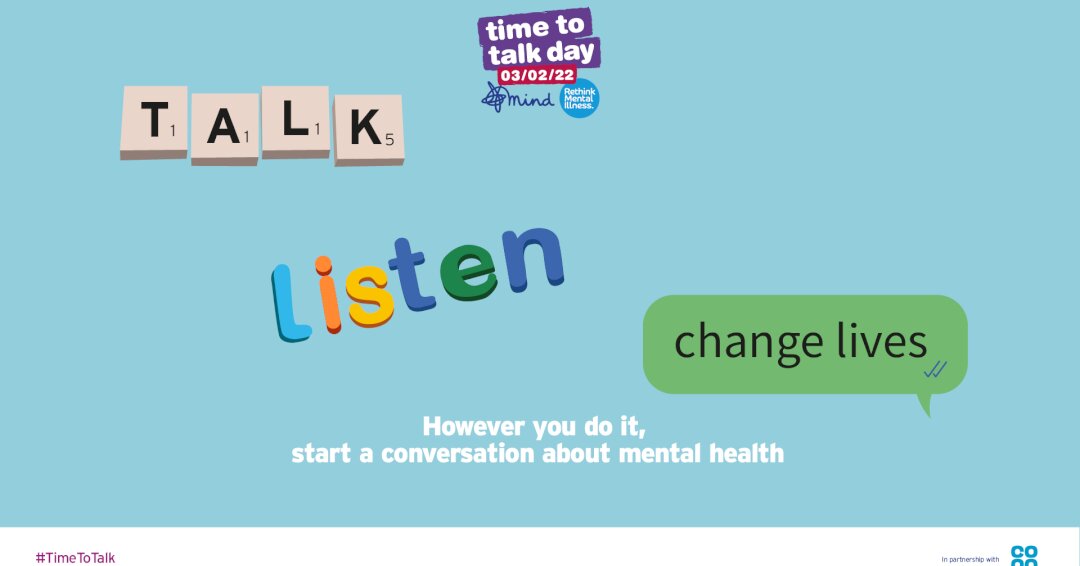Time To Talk Day
What is Time to Talk Day?
Who’s involved? And what’s it all about?
February 3rd 2022 has been marked as Time to Talk Day! It is a national day set up by mental health charities Mind and Rethink Mental Illness, in partnership with Co-op raising £8 million to help bring communities together in improving mental wellbeing.
The day is all about establishing supportive communities to be able to have conversations with family, friends, and colleagues about mental health. It is a day where everyone can come together to talk, listen, and change lives through communication and understanding!
Mental health has been a hot topic recently, thanks to the COVID-19 pandemic. Over the past two years, many people have suffered from issues such as burnout, depression, anxiety and substance addiction. In fact, 1 in 5 adults experienced some form of depression in early 2021, according to the Office for National Statistics. This is more than double the figure observed before the pandemic.
In 2022, mental health will continue to be a top concern for workplaces, and employers should take notice. According to a study carried out by mental health organisation Talkout, a staggering 85% of respondents felt like their mental well-being wasn’t made a priority by their employer during the pandemic.
With this in mind, employers will need to evaluate their mental health strategies and contemplate how they can help maximise their employees’ overall well-being. To help with this, employers can consider the following trends that may influence workers’ mental health in 2022.
Why is addressing mental health so important for employers?
1 in 4 people will experience a mental health problem in any given year. Each person’s experience of mental health is different – some will show signs of poor health openly, whilst others mask their signs making them not visible to those around them.
This is something that becomes very apparent in the workplace, where we spend a huge chunk of our lives. The stigma around mental health still very much exists at work, making the process of opening up to employers and colleagues a daunting task.
However, talking about mental health is one way to reduce this stigma, and creating supportive work communities is essential to feeling empowered about mental health. Mental health also hugely impacts workplace performance – 1 in 5 employees consider poor mental health as a factor that impacts productivity.
Employers also have a Duty of Care to their employees. Typically, this involves:
- Protecting staff against discrimination
- Making sure the work environment is safe
- Providing employee perks, where able, which protect physical and mental wellbeing
We can all become overwhelmed by life’s pressures, whether that’s work-related, or due to personal relationships or other circumstances. When the going gets tough, it’s important to have a support system in place capable of intervening. Ultimately, this benefits both employees and businesses.
Benefits of addressing mental health in the workplace:
Addressing mental health in the workplace is beneficial not only to the wellbeing of your staff but to the overall productivity and efficiency of your company. Below are a few examples of how promoting mental wellbeing can benefit:
- Reduces the stigma around mental health
- Promotes open discussion – enabling more people to ask for help
- Staff feel more comfortable reporting mental health as their main reason for sickness absence (rather than pretending it’s due to the flu, for example)
- Helps to detect early warning signs
- Promotes your company as proactive rather than reactive towards your employees
- Prevents further serious mental health issues/crisis e.g., suicide or self-harm
- Reduces absenteeism and presenteeism
- Reduces workplace discrimination
- Boosts morale and productivity as employees feel cared for and protected at work
‘We all hear it dozens of times a day, “How are you?”, “Fine thanks, how are you?” ‘Our research shows that, as a nation, we find it hard to answer honestly. ‘This could mean someone close to you is struggling with their mental health – they might just be waiting for your cue to talk about it. ‘Asking twice is a simple, effective way to show our friends and family members that we are asking for real; that we are ready to listen, whether that’s now or whenever they’re ready.”
Jo Loughran, Director, Time to Change


